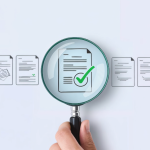In the world of governance, the importance of well-managed documents cannot be overstated. Governance documents—whether they be policies, procedures, compliance reports, or strategic roadmaps—serve as the foundation for organizational decision-making. However, one simple mistake in version control can send an organization down a dangerous path, leading to outdated policies, compliance errors, and even legal risks.
In this article, we’ll explore why version control is critical in governance, the consequences of poor version tracking, and how organizations can safeguard themselves with effective document management strategies.
The Dangers of Poor Version Control
Poor version control can create chaos in the governance framework, leading to a cascade of problems that often go unnoticed until it’s too late. When multiple versions of a document are circulating within an organization, confusion and errors become inevitable. But what exactly happens when version control is neglected?
- Outdated Policies: Governance documents are meant to reflect the most current regulatory, legal, and organizational standards. Without proper version control, it’s easy for documents to become outdated, putting an organization at risk of operating under obsolete or incorrect guidelines. For example, a policy document that hasn’t been updated to reflect recent changes in industry regulations could lead to non-compliance or regulatory fines.
- Compliance Failures: In highly regulated industries, compliance is not optional. Even the smallest mistake can result in severe penalties or legal ramifications. When version control is not maintained, teams may unknowingly work with outdated or incorrect documents, leading to compliance failures. For instance, if a department is using an older version of a safety policy that doesn’t reflect current laws, it could lead to non-compliance during an audit, resulting in legal consequences for the company.
- Conflicting Documents: Multiple versions of the same document can easily lead to conflicting policies or procedures. If two departments are using different versions of the same compliance manual, they might interpret and apply the rules differently, causing discrepancies in how governance is executed across the organization. This fragmentation can be costly, leading to inefficiency, miscommunication, and operational risks.
- Legal Risks: Legal documents that lack proper version tracking pose a significant risk to organizations. Without clear version histories, it can be nearly impossible to defend an organization’s position during legal disputes or audits. In some cases, outdated or conflicting versions of contracts, agreements, or compliance documents may be used as evidence, damaging the organization’s credibility and increasing exposure to legal liabilities.
How Version Control Protects Your Organization
Version control is more than just a process—it’s a safeguard against the chaos of miscommunication, compliance failures, and legal risks. Here’s why version control is essential for governance:
- Ensures Accuracy and Compliance: Proper version control ensures that all governance documents are current, accurate, and reflective of the latest laws, regulations, and organizational changes. By maintaining a clear version history, organizations can ensure they’re always operating under the correct policies, reducing the risk of non-compliance and legal issues.
- Provides a Clear Audit Trail: One of the most important aspects of version control is the ability to track changes. When every revision is documented, it creates a clear audit trail, showing what changes were made, when they were made, and who made them. This is essential for audits, legal defense, and maintaining transparency within the organization.
- Facilitates Collaboration and Consistency: Version control allows multiple teams and departments to collaborate on documents without fear of confusion or inconsistency. With the ability to see and work from the latest version, everyone involved can stay aligned, ensuring that governance decisions are consistent across the board.
- Minimizes Legal Exposure: In legal situations, having an accurate and complete record of your governance documents is crucial. Proper version tracking helps avoid situations where outdated or conflicting documents could be used in court. With clear version histories, you can confidently defend your policies and procedures if they’re ever challenged.
How Governancepedia Helps Maintain Version Accuracy
At Governancepedia, we understand that effective governance requires more than just creating documents—it’s about ensuring those documents remain accurate, up-to-date, and easily accessible. That’s why our platform offers powerful tools for version control, allowing organizations to track, update, and manage their governance documents seamlessly.
With Governancepedia, you can:
- Track Document Revisions: Our platform automatically tracks and stores versions of all documents, so you can easily see changes, updates, and modifications. This gives you full visibility into the history of your documents, ensuring that all stakeholders are working from the most current version.
- Centralize Document Storage: Governancepedia provides a secure, centralized space for all your governance documents. By storing all versions in one location, you eliminate the risk of conflicting versions and ensure that everyone in the organization has access to the same information.
- Ensure Compliance and Readiness: With automated version tracking, Governancepedia helps ensure that your governance documents are always in line with the latest regulations and policies. This minimizes the risk of compliance failures and ensures your organization is audit-ready at all times.
- Collaborate Efficiently: Our platform enables multiple teams to collaborate on documents while maintaining strict version control. This improves efficiency and consistency, ensuring that your governance processes are streamlined and aligned across the organization.
The Bottom Line: Version Control is Critical for Governance Success
Governance documents are not just administrative tools—they are the foundation of an organization’s compliance, risk management, and operational strategy. Without proper version control, these documents become a liability, putting the entire organization at risk.
By implementing a robust version control system, organizations can protect themselves from outdated policies, compliance errors, and legal risks. With Governancepedia, version control is made simple, efficient, and secure. Our platform ensures that your governance documents are always accurate, up-to-date, and easily accessible, giving your organization the confidence it needs to thrive in a complex, regulated world.
Governancepedia is your go-to platform for ensuring version-controlled governance documentation. Start using Governancepedia today to keep your documents secure, compliant, and up-to-date!



